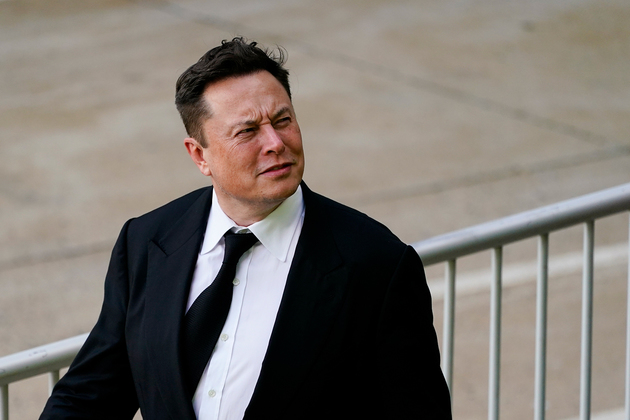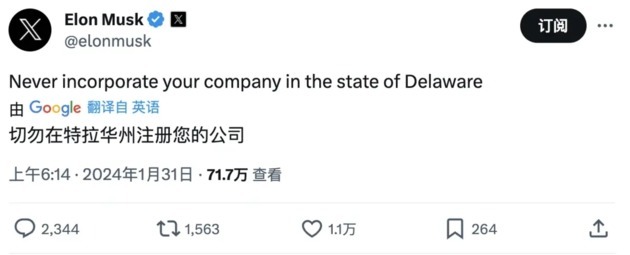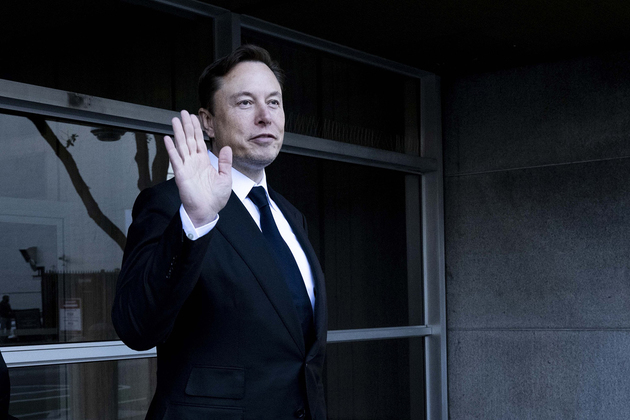
Photo/VCG
A Delaware judge ruled on Tuesday that Tesla CEO Elon Musk's $56 billion pay package is invalid, finding that the company's board of directors "failed to ensure that the compensation plan was fair."
The ruling came in a lawsuit filed by Tesla shareholder Richard Tornetta. After the ruling was announced, Tesla (TSLA) shares fell more than 3% in after-hours trading.

The CEO pay package granted to Musk in 2018 was unprecedented in corporate compensation plans, making the Tesla and SpaceX boss a billionaire and the richest person on Earth. In a tweet late Tuesday afternoon, Musk wrote, "Never ever incorporate your company in Delaware."
On November 14, 2022, local time, a lawsuit filed by Tesla shareholders against Musk’s $56 billion compensation package opened in the Delaware Court of Chancery, lasting for five days. During the trial, Robyn Denholm, the chairwoman of the electric car company Tesla, said that Tesla agreed to pay Musk about $56 billion (about 400 billion yuan) to serve as CEO, which was worth it, even though he spent his time on building a colony on Mars, and selling perfume and flamethrowers.
Denholm had said that Musk was the richest person in the world, and he had the “vision and perseverance” to turn Tesla from a startup into one of the most valuable companies in the world. Denholm has been a Tesla director since 2014. She said that the exact length of Musk’s work was not important, but the board needed his “focus and attention”.

Photo/VCG
At that time, Richard Tornetta, a small shareholder of Tesla, who owned nine shares of the company, claimed that the board did not get rid of Musk and made an independent decision when it set the compensation plan for the CEO in 2018. Tornetta said that the Tesla board’s compensation plan for a part-time CEO was the highest in the world.
Tesla CEO Elon Musk's compensation plan is tied to the company's market capitalization and operational milestones. Under the plan, Musk will receive stock awards worth billions of dollars if Tesla reaches certain targets. Each time both a market capitalization milestone and an operational milestone are met, Musk will vest in 1% of the company's outstanding shares. When the plan was approved, Musk owned about 22% of Tesla. If the company's market capitalization increases by $600 billion, his stake in Tesla will increase to about 28%.
It is noticed that Tesla reported its first annual profit decline since 2017. The company's 2023 financial results showed that total revenue was $96.773 billion, an increase of 18.79% year-over-year. Net income attributable to common shareholders was $14.997 billion. The company's gross margin for the full year was 18.2%, a decrease of 7.35 percentage points year-over-year. Adjusted earnings before interest, taxes, depreciation and amortization (EBITDA) was $16.631 billion, a decrease of 13% year-over-year. Non-GAAP net income attributable to common shareholders was $10.882 billion, a decrease of 23% year-over-year. Diluted earnings per share were $3.12, down 23% from a record $4.07 in 2022.
On the surface, Tesla's 2023 financial report appears to be solid. The company met its sales targets and achieved record revenue. However, a closer look at the numbers reveals some underlying concerns, such as slowing revenue growth and declining gross margins. These concerns were reflected in Tesla's stock price, which fell more than 12% on the day after the earnings report was released. The sell-off wiped out $80.1 billion in market capitalization and reduced Musk's net worth by about $18 billion. As a result, Musk lost his title as the world's richest person to LVMH CEO Bernard Arnault.
As of December 31, January, Musk regain his title as the world's riches person with 205 billion US. dollars, according to Bloomberg Billionaire Index.


 川公网安备 51019002001991号
川公网安备 51019002001991号





